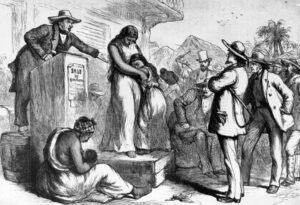
Articles
Bacevich, A. (2020). Reframing American History. Commonweal, 147(6), 13–15. https://databases.pennhighlands.edu/login?url=https://search.ebscohost.com/login.aspx?direct=true&db=f5h&AN=143375290&site=ehost-live&scope=site
Blum, E. J. (2017). “It Is True in More Senses Than One, That Slavery Rests upon Hell!” Embodiment, Experience, and Evil in African American Discussions of Slavery and Slaveholders. Journal of Religion, 97(3), 301–322. https://doi-org.databases.pennhighlands.edu/10.1086/691810
Gordon-Reed, A. (2018). America’s Original Sin: Slavery and the Legacy of White Supremacy. Foreign Affairs, 97(1), 2–7. https://databases.pennhighlands.edu/login?url=https://search.ebscohost.com/login.aspx?direct=true&db=f5h&AN=127090083&site=ehost-live&scope=site
Heuman, G. (1984). History Today, 34(4), 31. https://databases.pennhighlands.edu/login?url=https://search.ebscohost.com/login.aspx?direct=true&db=f5h&AN=4863559&site=ehost-live&scope=site
Kashatus, W. C., & Huntington, T. (2002). The Christiana Tragedy. American History, 37(4), 48. https://databases.pennhighlands.edu/login?url=https://search.ebscohost.com/login.aspx?direct=true&db=f5h&AN=7181885&site=ehost-live&scope=site
Kennington, K. (2019). “To favor the side of freedom”: judicial opinions and the law of slavery. Slavery & Abolition, 40(2), 225–239. https://doi-org.databases.pennhighlands.edu/10.1080/0144039X.2019.1606528
Phillips, G. (2007). Slave Resistance in the Antebellum South. History Review, 59, 34–39. https://databases.pennhighlands.edu/login?url=https://search.ebscohost.com/login.aspx?direct=true&db=f5h&AN=30002958&site=ehost-live&scope=site
Rosen, D. A. (2017). The concept of piracy in nineteenth-century American abolitionist rhetoric. Slavery & Abolition, 38(4), 697–718. https://doi-org.databases.pennhighlands.edu/10.1080/0144039X.2017.1341017
Schermerhorn, C. (2018). A history of slavery in the United States. https://www.aaihs.org/a-history-of-slavery-in-the-united-states/
Strickland, J. (2014). Teaching the History of Slavery in the United States with Interviews: Born in Slavery: Slave Narratives from the Federal Writers’ Project, 1936-1938. Journal of American Ethnic History, 33(4), 41–48. https://doi-org.databases.pennhighlands.edu/10.5406/jamerethnhist.33.4.0041
Books
Baptist, E. E. (2014). The half has never been told: Slavery and the making of American capitalism. New York: Basic Books, a member of the Perseus Books Group. 306.3620 B2293 2014
Basker, J. G. (2002). Amazing grace: An anthology of poems about slavery, 1660-1810. New Haven: Yale University Press. 821.008 Am157 B2928 2002
Berlin, I., Favreau, M., & Miller, S. F. (1998). Remembering slavery: African Americans talk about their personal experiences of slavery and freedom. New York: The New Press; In association with the Library of Congress. 920 R282 B4557 1998
Carbado, D. W., & Weise, D. (2012). The long walk to freedom: Runaway slave narratives. Boston, Mass.: Beacon Press. 306.3 L854 C17710 2012
Diouf, S. A. (2014). Slavery’s exiles: The story of the American Maroons. New York: New York University Press. 305.8 D624 2014
Drescher, S. (2009). Abolition: A history of slavery and antislavery. Cambridge; Cambridge University Press. 306.36209 D816 2009
Everill, B. (2020). Not made by slaves: Ethical capitalism in the age of abolition. Cambridge, Mass.: Harvard University Press. 174.409 B7898 2020
Hudson, J. B. (2006). Encyclopedia of the underground railroad. Jefferson, N.C.: McFarland &. 973.7 En197 H8682 2006
Manegold, C. S. (2010). Ten Hills Farm: The forgotten history of slavery in the North. Princeton: Princeton University Press. 974.403 M3129 2010
Mayer, H. (1998). All on fire: William Lloyd Garrison and the abolition of slavery. New York: St. Martin’s Press. 92 G1938 M4524 1988
Oakes, J. (2007). The radical and the Republican: Frederick Douglass, Abraham Lincoln, and the triumph of antislavery politics. New York: W.W. Norton &. 973.70Oa43 2007
Rediker, Marcus. The Amistad Rebellion: an Atlantic Odyssey of Slavery and Freedom. Viking, 2012. 326.0973 R2482 2012
Rodriguez, Junius P., and Orlando Patterson. Chronology of World Slavery. ABC-CLIO, 1999. 306.36209 R6186 1999
Sublette, N., & Sublette, C. (2016). The American slave coast: A history of the slave-breeding industry. Chicago: Lawrence Hill Books. 331.11 Sa161 2016
Wright, G. (2006). Slavery and American economic development. Baton Rouge: Louisiana State University Press. 306.3620973 W9322 2006
Links
For additional information, click on the links below…
Enslaved.org – Explore or reconstruct the lives on individuals who were enslaved, owned slaves, or participated in the historical trade. https://enslaved.org/
What to the Slave is the Fourth of July? A Community Read of Frederick Douglass’ speech. Community Read (At the 26 second mark, see local Johnstown African Americans recite a portion of the speech from the historic First Cambria AME Zion Church.)
U.S. Slavery Timeline – Throughout the 17th and 18th centuries people were kidnapped from the continent of Africa, forced into slavery in the American colonies and exploited to work as indentured servants and labor in the production of crops such as tobacco and cotton.
National Museum of American History – Slavery in America Collection
African Americans had been enslaved in what became the United States since early in the 17th century. Even so, by the time of the American Revolution and eventual adoption of the new Constitution in 1787, slavery was actually a dying institution. As part of the compromises that allowed the Constitution to be written and adopted, the founders agreed to end the importation of slaves into the United States by 1808.
Local Focus
The incident of Patrick and Abraham took place in the spring of 1837. It began in Bath, Virginia and ended in Johnstown. The attached file is the application that put Sandyvale Cemetery on the National Network to Freedom. Sandyvale was selected because it is the location where many of the abolitionists involved in the incident are interred.
Sandyvale Network To Freedom Application
Videos
PittOnline Anti-black Racism Class
(Used with permission)
Slavery and Emancipation Part 1
Slavery and Emancipation Part 2
YouTube Videos